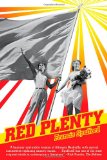Francis Spufford’s Red Plenty may be the most fascinating book I’ve read in a long, long time. It’s the rare book where you think about the subject and have a hard time believing you are so involved with it.
 On the surface, Red Plenty is, for lack of a better term, a literary history of the central planning of the Soviet Union’s economy in the 1960s. The U.S.S.R.’s goal was to “overtake and surpass” capitalist economies and produce a horn of plenty. While economic planning seems a dry and boring topic, Spufford totally blurs the line between fiction and history. The book relates the history of this period through the eyes of more than a dozen real and fictional politicians, economists, technocrats and even a “fixer” with fact-based fiction. How often do you read a novel with some 50 pages of endnotes and a 13-page bibliography?
On the surface, Red Plenty is, for lack of a better term, a literary history of the central planning of the Soviet Union’s economy in the 1960s. The U.S.S.R.’s goal was to “overtake and surpass” capitalist economies and produce a horn of plenty. While economic planning seems a dry and boring topic, Spufford totally blurs the line between fiction and history. The book relates the history of this period through the eyes of more than a dozen real and fictional politicians, economists, technocrats and even a “fixer” with fact-based fiction. How often do you read a novel with some 50 pages of endnotes and a 13-page bibliography?
Red Plenty goes beyond typical historical fiction or creative nonfiction. Spufford, in fact, calls it a Russian fairytale. With what he terms “inter-chapters” printed in italics that break up the book, we get essays that summarize the actual history and interplay of theory, politics and economics. Each chapter is told by a different character and shows us the local and personal reality of the politics and the process. This approach makes entirely readable a topic that might otherwise glaze the eyes of all but Sovietoligists and economists.
Red Plenty isn’t for everybody. It helps if you have at least some interest in the Soviet Union or the Cold War. The book also can occasionally get too theoretical or sometimes forces the reader to refer back to the cast of characters to see if we’ve met a particular narrator or character earlier in the book. But that does not keep it from being a success.
As a side note, a huge tip of the hat should go to Graywolf Press for bringing the book, first published in the U.K. in 2010, to the U.S. Over the last few years the St. Paul-based publisher has excelled at publishing exceptional American and foreign fiction.
Intellectuals with their noses in the air might not care if they sat on hard stools or comfy chairs, but everyone else preferred a bit of padding under their arse.
Francis Spufford, Red Plenty








Sounds fascinating!